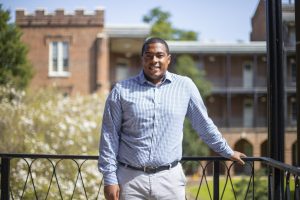
When Alex Haley’s “Roots” came out as a book in 1976 and as a TV miniseries the following year, it had a profound cultural impact on black Americans in helping them to discover and accept their identity.
The novel/TV series tells the symbolic story of black America through the decades-long tale of one family — Haley’s — from his ancestor Kunta Kinte in his birthplace of Gambia, Africa, to his enslavement through the trans-Atlantic slave trade, to seven generations of his descendants growing up in America, ending with Haley himself in the 20th century.
And just as “Roots” is a powerful story that serves as a lens to view and interpret life for those who identify with it, the books of the Bible have done likewise for countless people for millennia.
Dr. Richard Newton, a new assistant professor of religious studies at The University of Alabama, finds the impact on human life that both “Roots” and the Bible have engendered to be fascinating — so much so that he’s writing a book, “Identifying Roots: Alex Haley and the Anthropology of Scripture,” that examines how texts like “Roots” inform people’s understanding of identity. He hopes to someday teach a new class at UA on the subject as well.
“Some scholars have said, ‘you can’t look at Alex Haley’s “Roots” with scripture,’” Newton said. “I said ‘well, why not?’ People are still talking about “Roots” because it continues to say something about who they are in America. Isn’t that precisely the kind of thing people are talking about when they call something scripture?
“So I use ‘Roots’ as a modern example to think about the larger phenomena of scripture as cultural texts, not just the texts that people read, but the texts that appear to read them back — telling them where they’re from and where they’re going, their identity.
“I’m interested in finding out about the politics behind people’s consultation of texts and why they use them to make sense of themselves and others. That’s why the category of ‘scripture’ is of use to me. I’m using Alex Haley’s “Roots” as a model on how to look at and talk about the very notion of a scripture.”

Newton comes to UA’s religious studies department from Elizabethtown College in Pennsylvania, where he taught religious studies for four years. He said he finds it interesting how certain stories take on a life of their own — not just words on a page, they take on life through what people do with those words once they absorb them.
“People want to know where they come from,” he said. “People have this idea that they come from somewhere/something greater. ‘Roots’ was a watershed moment for African Americans that they were able to use to figure out how they fit into the American story.
“The idea of knowing your roots and knowing where you come from tells you where you’re going. When presented shoddily, it’s kind of cliché, but when it’s presented compellingly we take for granted the texts that orient us.”
Newton currently teaches a course on Islam, a graduate course on the history of religious studies and an introduction to the New Testament course.
He earned his doctorate in religious studies with a focus on critical comparative scriptures from Claremont Graduate University, a master’s of divinity from Southern Methodist University, and a bachelor’s in religious studies and anthropology from Texas Christian University.
